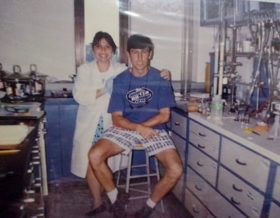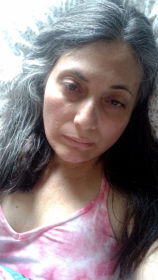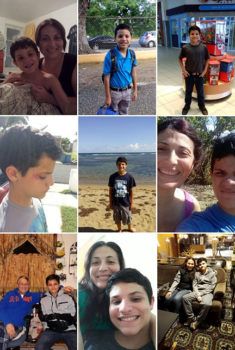BAL Spotlight Series
In Puerto Rico, Donating Your Body to Science is Almost Impossible

Luisette Mauras Rodriguez is lying in bed at home in Guyana, Puerto Rico, waiting to die. She’s 46 years old, her body ravaged by Lyme, numerous tick-borne coinfections, and a multitude of other hits caused by environmental exposure to toxins like black mold, fungus, mycoplasma, and chikungunya virus. Family members do not understand her illness and laugh at her ‘exaggerations.’ Her husband left her because he fears getting sick and his religious convictions cause him to question the validity of her condition. Her mother, formerly a registered nurse, has abandoned her to her fate. Whenever Luisette gets desperate for help and goes to the ER, they refer her to the psych ward saying her illness is fabricated.

A former professional lab technician who worked in pharmaceutical development with US companies like Wyeth, SmithKline Beecham, and IPR Pharmaceuticals, Luisette has one dying wish: to donate her body to the Lyme Disease Biobank (LDB) so that samples from her brain, joints, organs, and tissues will be used to fuel much-needed research into Lyme and tick-borne diseases. She has registered with the National Disease Research Interchange (NDRI) in Philadelphia to have her body collected after her death, but as of writing this article, staff there are unable to find any medical professional on the island willing to partner with them to ensure this happens.
“We have been unsuccessful in securing anyone for recovery for the donor located in Puerto Rico. It has been very difficult getting anyone to follow up with us on top of the language barrier. We were trying to give the pathology department at the University time to get back to us but they seem to be very busy. The complexity of the recovery also makes it more difficult as well.” — Wauchita Green, Manager, Organ & Tissue Source Sites, NDRI, The National Disease Research Interchange
Finding Answers is Her Dying Wish

For a scientist with a degree in chemistry, the pursuit of knowledge and answers is a fundamental aspect of Luisette’s character. Her 20-year health struggle with Lyme is ending in absolute physical disability and ongoing mental anguish. Yet the idea of dying is made bearable by the prospect of scientists developing greater understanding of tick-borne infections by studying her tissues. But there are insurmountable barriers to her achieving this final, selfless act of courage.
“I know I will die soon; all the signs are there. My body is literally putrefying in front of my eyes. I can no longer eat or digest anything. I just want to donate my body to the Lyme Disease Biobank so others who come after me don’t go through this hell, but there’s nobody here in Puerto Rico who will help us do it.”
Although zoonotic diseases transmitted by mosquitoes like malaria and zika are widely understood and treatment is readily available in Puerto Rico, medical ignorance about ticks is a significant hurdle. With no doctors knowledgeable about treating chronic/persistent Lyme on the island, and almost zero awareness of tick-borne diseases in this US territory, it’s been impossible for Luisette to find anyone to take her illness seriously. Plus, Puerto Rico is an extremely conservative place. Cultural and religious beliefs add layers of additional pain to her already desperate situation.
“My family believes that I have done something in my life that caused this illness. They believe that God is punishing me. And until I make it right with God, I will continue to be this way. They don’t understand—and they don’t want to understand—that there are pathogens in my body that have caused this horrible situation.”

The other major driver in Luisette’s determination to donate her body to LDB is her 17-year-old son, Louis. He is also sick and has faced a multitude of physical and mental problems since the day he was born. Luisette is convinced that she passed tick-borne pathogens to him when she was pregnant and that he has congenital Lyme. She worries about what will happen to him after she dies. “I believe he is already on the verge of the later stages of Lyme. He cannot get any treatment here. The doctors washed their hands of him—just as they have done with me.” Her voice breaks for the first time as she ponders her child’s fate.
Exposure to Ticks During Summer Internships?
Luisette was a model student. She did extremely well at school and always loved science. Studying chemistry, she worked to position herself for an excellent job in pharmaceuticals in Puerto Rico. For two summers, she worked internships in the contiguous US: in 1996 she won a paid internship at SmithKline Beecham Pharmaceuticals’ R&D division in King of Prussia, Pennsylvania. And in the summer of 1997, she worked in a lab at Cornell University in upstate New York. She was the youngest person in the lab and the only scientist who was an undergraduate at the time.
“After work each day during both of these internships, I would go out walking in the woods and on trails nearby. It was beautiful and I loved being out in nature. Nobody ever said anything to me about the dangers of ticks, or that they harbored pathogens. I remember picking ticks off myself numerous times. I didn’t think anything of it.”
Luisette’s battle with various inexplicable illnesses began with the onset of anxiety and depression in her early 20s. Her mental health declined, and she was treated for these symptoms, but showed little progress. Later, as physical issues began to emerge, like many Lyme patients, Luisette found herself on an endless quest for a diagnosis and treatments, but as all the standard tests performed on her kept coming back negative, she was quickly labeled as a ‘problem patient.’ Despite these ongoing challenges, Luisette married and gave birth to her son. But the decade following his birth brought more declines in her health and inexplicable medical problems. She went looking for answers online and finally started to uncover what was at the root of both her issues and her son’s developing problems.
Internet Searches Started Providing Answers

“In 2016, I started to learn about Lyme and tick-borne diseases and all of a sudden, I understood what was wrong with me. I would go to the ER and tell them that I had Lyme, and they would look it up according to the CDC protocols and say ‘Oh – that’s curable.’ But of course, by the time I was being seen, I was already chronically ill and the treatment would not work. I was stuck in a spiral, constantly dismissed, and abused. The doctors in Puerto Rico who did have any empathy or understanding of my condition would tell me they couldn’t treat me here and that I had to go to the US.”
As Luisette’s condition worsened and dragged on into years of not receiving appropriate treatment on the island, she sought help from doctors who promoted that they were knowledgeable about treating Lyme, so she traveled to the East Coast multiple times, seeing providers from CT to FL. Her experiences, so filled with hope, would quickly devolve into deepening despair as she found herself subject to questionable therapeutics, useless medications, and unproven protocols that left her sicker than before the treatment, plus tens of thousands of dollars poorer and even more isolated and afraid for her future.
Reflecting on her situation, Luisette cannot help but be angry.
“I don’t understand how you can take your dog or cat to the veterinarian when they are sick and they can get tested for borrelia, or Bartonella or other pathogens and get treatment and get better! It’s scandalous to me. It’s a crime. When I think about the inhumane treatment I have gone through over the years and that I still cannot get anyone here in Puerto Rico to listen to me, I know I am a victim of medical abuse and medical malpractice. This situation is criminal.”
When Luisette learned about Bay Area Lyme and the Lyme Disease Biobank program, she felt that her search for answers may not be completely in vain. “I know it’s too late for me because I am dying, but maybe one of the BAL or LDB research projects will develop acute and chronic diagnostics that will prove that we are really sick and it’s not all in our minds. I just pray every day that it’s not too late for my son to get help.”
This blog is part of our BAL Spotlight series. Bay Area Lyme Foundation provides reliable, fact-based information so that prevention and the importance of early treatment are common knowledge. For more information about Bay Area Lyme, including our research and prevention programs, go to www.bayarealyme.org.

please God I hope this woman is still alive. If she is please someone tell her about Bee Venom Therapy. it will save her life!!!!
Hi. I am still alive. I havent found any tolerable treatement or the Drs i have contacted asked me to move To Usa due to the severity of the conditions and liability. Since I dont have the funds, neither the support to help me doing calls, raising funds etc, Its been difficult to keep contacting more practitioners, even to treat my son cause he would not be able to do all whats needed to follow a protocol. After all these past years, and having a better understanding that i get from formal patients, Drs, clinics, healers, herbalists, books, etc, we were “mold illness patients” plus lyme and coins. Unfortunately, the Drs I firstly visited in Usa and treated me never tested me or my son for this mold toxicity, which now is affecting deadthly millions in the the lyme and “long hauler covid community”. All of them Ilads Drs, just mistreated me and left me bedrriden between 2018, 2019 without serious letters explaining my advanced stage and poor chances to survive. I contacted a bee venom trainer when i was in Ct, receiving my first big mistreatement, without cetainly knowing. Sadly , the Dr did a huge killing in my body of pathogens without stabilizing me first and letting me super toxic and with a complete disrrupted biome, worse than when i was untreated. I did several stings, cant tell if it was going to work cause my body was previously left with high load fungus and toxic. Not detox methods were explained to me when getting the bicillin injections, followed by a picc line with Rocephin. So learned further, you cant kill without proper techniques and methods to detox, if not the patient will have a bigger toxic burden and will worsen the situation. Later on , I contacted another lady that get remission with bee venom, and was sincere to me telling me i needed to detox first beggining with the stings. Unfortunately, seems Drs and even patients dont understand that the lymphatic , kydneys, liver, skin, are detoxing organs that needs ro be supported with any ttmnt. The sicker the patient, the slower the “killing” to avoid toxins recirculate and affecting to those organs infected already. As per now trendy mold illness, needs to b treated first and those heavy colonized patients, due to continous exposure to water damage buildings, or other sources, are used to be inmunosuppresed, theres no ttmnt that will work. Thats whats ive been told from mold trained Drs though zoom consultations like from Bionexus health, and some Drs trained by Dr Jill Crista and Neil Nathan. All of these happened lately in my journey, while my son depends on me as the main support since a child. I have losted tragically several friends due to late dx, mistreatements and many similar patterns including unsupportive and abusive , negligent relatives and Drs. So, thanks for your comment. The organs are very stressed at this point and the lymphatic system, nodes are mostly degenerated so the toxins keep recirculating and pathogens replicating. If you wish to contactvme directly i can provide my email, but its an advanced terminal stage without any care from regular medicine or the so call lyme trained Drs. Horrific situation i never expect to live. Mayb years ago bee venom would be a real aternative along with proper detoxing and other complementary ttmnts, cause i know it have worked for others. Thanks again for your post, empathy, prayers and for trying to help.
Regards,
Luisette
Luisette,
I was on the BAL site tonight looking for info on tissue donation options for an upcoming surgery and I saw your story. Cooincidently, you just posted a response yesterday 10/15/23. I am so sorry very for the struggles you have endured and I understand: I am a biochemist who worked in San Diego biotech, was diagnosed with Lyme following a tick bite in 2008, but docs didn’t believe it. As a scientist and previous advocate for cancer patients, I have been appalled with the process I have gone through. As you stated, it is unacceptable.
I grew up in PA near King-of-Prussia and my father was a pilot tissue donor to BAL LDB in 2016 when he died with untreated Lyme disease. I would love to connect and see how I might support you. Be strong.
I am hopeful folks at BAL can connect us. I am happy to be in direct contact.
My heart goes out to dear Luisette all this needless suffering because the medical world has not caught up with pathogen activity. I pray Luisette and those who suffer physical and invisible mental pain in this life will realise that this life is not all… be reborn anew with joyful, glorious well being in the next.
Amen
Dear Berni:
I saw your comment recently. I have worsened in the last months at a faster rate than ever. I still dont know how I am still breathing. The pathologist could not be found and I could not received any palitative treatement or hospice care. Neither the situation with my relatives changed for better for me or my son. Thank you so much for taking the time and sending me your lovely and supporting message. I really hope this life is not all and I can meet in another with many warriors like us that are been plagued with illnesses and suffered deeply the denial, abandonment ” til their last breath”. Seems my last wish can not be achieved. I hope BAL and other organizations can reached out more patients and their research can save lifes in a very near future. Blessings for you and your loved ones.
Sincerely, Luisette 🙏